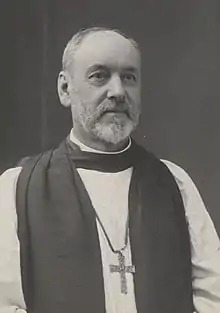Edward Hicks (bishop)
Edward Lee Hicks[1] (23 December 1843 – 14 August 1919) was an eminent[2] Anglican priest[3] and author[4] who served as Bishop of Lincoln[5] 1910–1919.[6]
Edward Hicks | |
|---|---|
| Bishop of Lincoln | |
 | |
| Diocese | Diocese of Lincoln |
| In office | 1910–1919 |
| Predecessor | Edward King |
| Successor | William Swayne |
| Orders | |
| Ordination | 1886 |
| Personal details | |
| Born | 23 December 1843 Oxford, Oxfordshire, United Kingdom |
| Died | 14 August 1919 (aged 75) |
| Alma mater | Brasenose College, Oxford |
Life and works
Born in Oxford in 1843, Hicks was educated at Magdalen College School and Brasenose College, Oxford[7] and ordained in 1886.[8] After a spell as Fellow and Tutor at Corpus Christi College, Oxford[9] he was Rector of Fenny Compton[10] before becoming the first Principal of Hulme Hall. After this he was a Canon Residentiary wasof Manchester Cathedral, then Rural Dean of Salford[11] until his elevation to the Episcopate.[12] He had not been supported by the Archbishop of Canterbury for the post. ‘I do not think Hicks would do for Lincoln .... ‘ The Archbishop regarded Hicks as a ‘faddist’ who threw ‘himself eagerly not to say fanatically into any cause which he espouses’. But at that time Prime Minister Asquith was the key figure in episcopal appointments and, influenced by Hicks as a ‘strong Liberal in politics’, recommended him to the Crown for the post at Lincoln. [13]
During the Great War, unlike other bishops, Hicks did not encourage recruitment to the Forces nor did he condemn Germany. He was peace-loving, and had promoted ‘an honourable neutrality of Great Britain. [14] He was accused of cowardice, and produced a strong reply to his critics showing prescience of what the Great War would involve. ‘Anyone who knows what war means - its stoppage of industry, its heaping up of debt and taxation, its unemployment, its famine, its missing at home, its paralysis of all effective work and expenditure on Social Reform, not to mention the horrible carnage of the battlefield, the agonies of the wounded, the visitations of disease and pestilence that always follow campaigns and battles - will be the last to tax me with cowardice if I confess to a loathing of war.’[15] During the Great War, he lost a son, Edwin, in 1917 and gave up part and eventually the whole of his palace, first for the use of Belgian refugees and then to the Red Cross. [16]Novelist and biographer Penelope Fitzgerald was his granddaughter.[17]
References
- NPG details
- American Libraries
- “Edward Lee Hicks: Bishop of Lincoln, 1910-1919” Neville,G: Carshalton, Honeywood, 1994 ISBN 1-870561-08-2
- Amongst others he wrote: “Greek Inscriptions in the British Museum”, 1874; “Henry Bazely the Oxford Evangelist”, 1886; “Addresses on the Temptation”, 1903;and “Building in Troublous Times”, 1912 > British Library Catalogue accessed 14 May 2009
- The Times, Saturday, 25 June 1910; p. 5; Issue 39308; col B Ecclesiastical Intelligence New Bishop of Lincoln
- Diocesan web-site
- The Times, Friday, 15 June 1866; p. 12; Issue 25525; col C University Intelligence
- The Times, Tuesday, 26 September 1871; p. 4; Issue 27178; col D Ordinations Oxford
- Who was Who 1987-1990: London, A & C Black, 1991 ISBN 0-7136-3457-X
- Parish history Archived 2005-09-01 at the Wayback Machine
- ”The Clergy List” London, Kelly’s, 1913
- National Archives
- Lambeth Palace Library, Davidson X, has correspondence relating to Hicks being considered for Norwich and Lincoln
- Lincoln Diocesan Magazine, September 1914
- Lincoln Diocesan Magazine, September 1914
- ‘The Knox Brothers’ by Penelope Fitzgerald, Macmillan, 1917, p127 and p148
- The Guardian
Further reading
- GR Evans, Edward Hicks: Pacifist Bishop at War, Lion Hudson, 2014, ISBN 9780745956534
- JH Fowler, The Life and Letters of Edward Lee Hicks, London: Chroistophers, 1922
- Graham Neville, Radical Churchman: Edward Lee Hicks and the New Liberalism, Oxford University Press, 1998, ISBN 0198269773
| Church of England titles | ||
|---|---|---|
| Preceded by Edward King |
Bishop of Lincoln 1910–1919 |
Succeeded by William Swayne |
